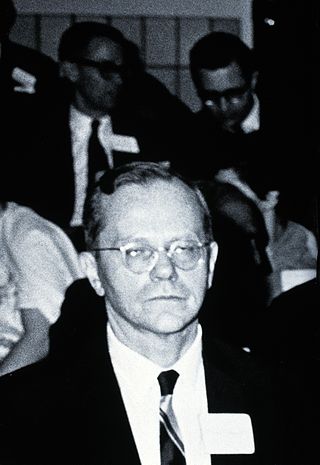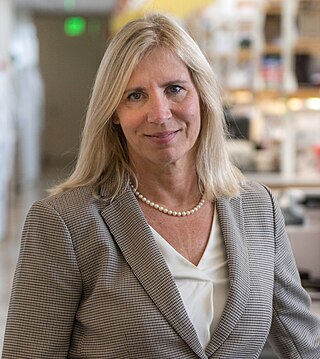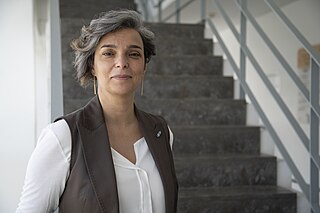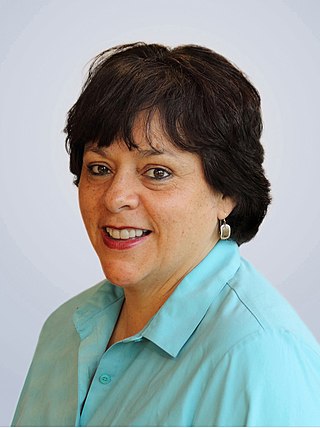
Plasmodium ovale is a species of parasitic protozoon that causes tertian malaria in humans. It is one of several species of Plasmodium parasites that infect humans, including Plasmodium falciparum and Plasmodium vivax which are responsible for most cases of malaria in the world. P. ovale is rare compared to these two parasites, and substantially less dangerous than P. falciparum.

Alexandre Joseph Émile Brumpt was a French parasitologist.
The American Society of Tropical Medicine and Hygiene (ASTMH) is an Arlington, Virginia-based non-profit organization of scientists, clinicians, students and program professionals whose longstanding mission is to promote global health through the prevention and control of infectious and other diseases that disproportionately afflict the global poor. ASTMH members work in areas of research, health care and education that encompass laboratory science, international field studies, clinical care and country-wide programs of disease control. The current organization was formed in 1951 with the amalgamation of the American Society of Tropical Medicine, founded in 1903, and the National Malaria Society, founded in 1941.
Jonathan James Juliano is an American physician/scientist. He currently works at UNC School of Medicine.

Jane M. Carlton is a biologist at Johns Hopkins University whose research centers on two groups of single-celled parasites: those which cause malaria, and trichomonads, which include the common sexually transmitted parasite Trichomonas vaginalis. She is a Bloomberg Distinguished Professor of Malaria Genomics and Public Health. She holds primary appointments in the Department of Molecular Microbiology and Immunology in the Bloomberg School of Public Health and in the Department of Biomedical Engineering, a department shared by the Whiting School of Engineering and the School of Medicine. She is also the director of the Johns Hopkins Malaria Research Institute.

Lewis Wendell Hackett was an American physician who worked in Italy, Albania and South America to combat malaria.

Henry Edward Shortt was an Indian-born British protozoologist.
The Donald Mackay Medal is awarded for outstanding work in tropical health, especially relating to improvements in the health of rural or urban workers in the tropics. It is named after Donald Mackay, who was deputy Director of the Ross Institute at the London School of Hygiene and Tropical Medicine.

William Trager was an American parasitologist, professor at Rockefeller University, and member of the National Academy of Sciences of the United States. Trager's research focused on developing microbiological culture systems for a variety of eukaryotic pathogens. He is best known for developing a culture system for the malaria parasite Plasmodium falciparum with James Jensen in the 1970s.

Abdoulaye Djimdé is an associate professor of Microbiology and Immunology in Mali. He works on the genetic epidemiology of antimalarial drug resistance and is a Wellcome Sanger Institute International Fellow. He is Chief of the Molecular Epidemiology and Drug Resistance Unit at the University of Bamako Malaria Research and Training Centre.
William Erle "Bill" Collins was an American parasitologist.

Elizabeth Ann Winzeler is an American microbiologist and geneticist. She is a professor in the Division of Host-Microbe Systems and Therapeutics of the School of Medicine at the University of California at San Diego. Although she works in a variety of different disease areas, most research focuses on developing better medicines for the treatment and eradication of malaria.

Maria Manuel Mota is a Portuguese malariologist and executive director of the Instituto de Medicina Molecular João Lobo Antunes, Lisbon.

Carolina Barillas-Mury is the chair of the Mosquito Immunity and Vector Competence Section and Director of the Malaria Research Program at the National Institute of Allergy and Infectious Diseases of the National Institutes of Health. She studies how mosquitos transmit diseases like malaria, and in recognition of her research, she has been elected to the National Academy of Sciences.
Kamini Nirmala Mendis is a Sri Lankan professor emeritus at the University of Colombo and former malaria expert at the World Health Organization (WHO).

Nicolaas Hendrik Swellengrebel was a Dutch epidemiologist, parasitologist, pathologist, and specialist on several human diseases, particularly malaria. He pioneered an ecological approach to the management of the habitat to control vector species that he called as "species sanitation." The N.H. Swellengrebel Laboratory for Tropical Hygiene in Amsterdam is named after him.
Joseph Michael Vinetz is a Professor of Medicine and Anthropology at Yale University, Research Professor at the Universidad Peruana Cayetano Heredia and Associate Investigator of the Alexander von Humboldt Institute of Tropical Medicine at the Universidad Peruana Cayetano Heredia.

Christian Happi is a Professor of Molecular Biology and Genomics in the Department of Biological Sciences and the Director of the African Centre of Excellence for Genomics of Infectious Diseases, both at Redeemer’s University. He is known for leading the team of scientists that used genomic sequencing to identify a single point of infection from an animal reservoir to a human in the Ebola outbreak in West Africa. His research focus is on infectious diseases, including malaria, Lassa fever, Ebola virus disease, HIV, and SARS-CoV-2.

Stephen L. Hoffman is an American physician-scientist, tropical medicine specialist and vaccinologist, who is the founder and chief executive and scientific officer of Sanaria Inc., a company dedicated to developing PfSPZ vaccines to prevent malaria.

David A. Fidock, is the CS Hamish Young Professor of Microbiology and Immunology and Professor of Medical Sciences at Columbia University Irving Medical Center in Manhattan.














